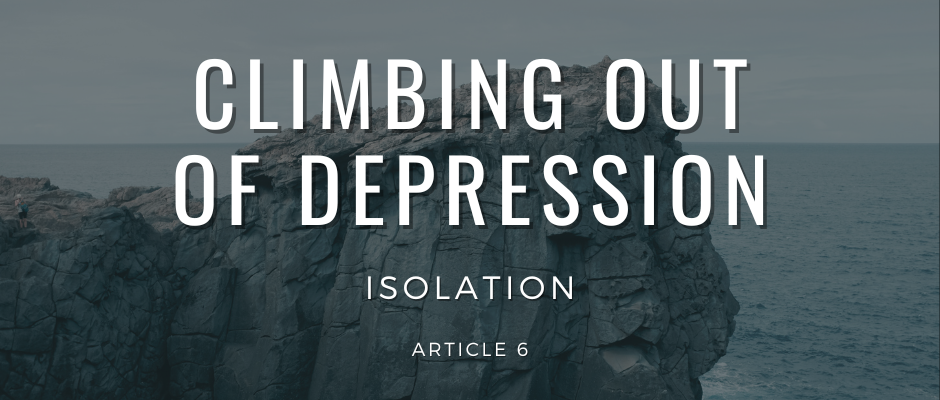Climbing Out of Depression: Isolation

Depression often leads to withdrawal from social activities. It’s like retreating into a cave where the darkness feels safer than facing the light. This self-imposed isolation is a common response to the overwhelming emotions and fatigue that accompany depression. While solitude can sometimes be beneficial for reflection and self-care, prolonged isolation exacerbates feelings of loneliness, despair, and disconnection.
Understanding Isolation in Depression
When you’re struggling with depression, social interactions can feel exhausting and unmanageable. The effort required to engage with others, make conversation, and participate in activities can seem insurmountable. This leads many to withdraw, avoiding gatherings, canceling plans, and spending more time alone.
This withdrawal is often driven by several factors:
Low Energy and Fatigue: Depression drains your physical and emotional energy, making socializing feel like a daunting task.
Negative Self-Perception: Feelings of worthlessness and self-doubt make you believe that others won’t want to be around you, or that you’re a burden.
Overwhelm and Anxiety: Social situations can become overwhelming, causing anxiety and stress that lead to avoidance.
The Impact of Isolation
While a temporary retreat can sometimes provide much-needed rest, prolonged isolation can worsen depression. Humans are inherently social beings; connection with others is crucial for mental and emotional well-being. Isolation can lead to:
Increased Loneliness: Without regular social interaction, feelings of loneliness and alienation intensify. This can create a feedback loop where the more isolated you feel, the harder it becomes to reach out.
Worsening Symptoms: Isolation often leads to a deeper sense of despair and hopelessness. The lack of external perspectives and support can make negative thoughts and feelings more entrenched.
Loss of Support Networks: Avoiding social activities can strain relationships and erode support networks. Friends and family may not understand why you’re withdrawing, leading to misunderstandings and further isolation.
Tips to Combat Isolation
Breaking the cycle of isolation involves gradually re-engaging with the world, even when it feels challenging. Here are some strategies to help you reconnect:
Start Small: Begin with small, manageable social interactions. This could be a brief phone call with a friend, a short visit with family, or even a chat with a neighbor. Gradually increase the duration and frequency of these interactions as you feel more comfortable.
Set Realistic Expectations: Don’t pressure yourself to participate in large gatherings or events right away. Set realistic goals that align with your current energy levels and mental state. Remember, even small steps are progress.
Join Support Groups: Consider joining support groups for people experiencing similar challenges. Whether in-person or online, these groups provide a safe space to share experiences, gain support, and feel less alone.
Combine Socializing with Activities: Engage in activities that interest you, and do them with others. This could be joining a climbing group, taking a class, or participating in a hobby group. Shared activities can make socializing feel less forced and more enjoyable.
Use Technology: If face-to-face interactions feel too daunting, start with virtual connections. Video calls, social media, and online communities can help you stay connected and ease the transition to more direct interactions.
Be Honest with Loved Ones: Communicate with friends and family about what you’re going through. Let them know that your withdrawal is due to depression and not a reflection of your feelings towards them. Honest communication can foster understanding and support.
Schedule Social Time: Make socializing a part of your routine. Schedule regular times to connect with others, even if it’s just for a few minutes. Having it on your calendar can provide structure and accountability.
Seek Professional Help: A therapist can help you develop strategies to overcome isolation and manage social anxiety. They can also provide a safe space to explore and understand your feelings of withdrawal.
Personal Reflection
In my own battle with depression, isolation was a significant hurdle. There were times when the thought of interacting with others felt overwhelming and retreating into solitude seemed like the only option. However, I soon realized that while solitude provided temporary relief, it also deepened my feelings of loneliness and despair.
I started with small steps: texting a friend, joining a local climbing group, and attending support meetings. Each interaction, no matter how brief, helped me reconnect with the world and reminded me that I wasn’t alone. Gradually, I began to rebuild my support network and found strength in the connections I made.
Final Thoughts
Isolation is a common and challenging aspect of depression, but it’s important to remember that reaching out and reconnecting can make a significant difference in your mental health. Take it one step at a time, be patient with yourself, and know that every effort to connect is a step towards healing.
Remember, you don’t have to climb out of the darkness alone. There are people who care about you and want to help. Reach out, take small steps, and allow yourself to be supported. Together, we can overcome the isolation and find our way back to the light.
.png)

Comments